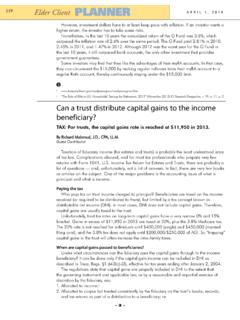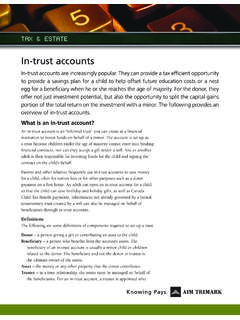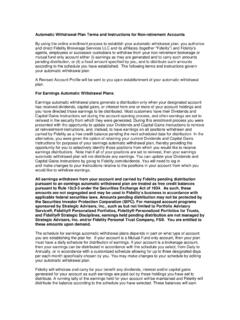Transcription of PUBLISHER CO-PUBLISHER - University of St. Thomas
1 PUBLISHERDICASTERY FOR PROMOTING INTEGRAL HUMAN DEVELOPMENTP iazza San Calisto, 16I - 00120 Vatican A. RYAN INSTITUTE FOR CATHOLIC SOCIAL THOUGHTOF THE CENTER FOR CATHOLIC STUDIESAt the University of St. Thomas ,Minnesota, Paul, September 2018 This fifth edition incorporates several recent teachings from Pope Francis on vocation of business, integral ecology, the technocratic paradigm and the importance of a more just distribution of OF THE BUSINESS LEADER: A REFLECTION1 The present volume had its origins in several meetings in 2010 and 2011 that were inspired by the Encyclical Letter Caritas in Veritate of Pope Emeritus Benedict XVI. Besides the former Pontifical Council for Justice and Peace (PCJP), collaborating institutions included the John A.
2 Ryan Institute for Catholic Social Thought of the Center for Catholic Studies at the University of St. Thomas , the Ecophilos Foundation, the Institute for Advanced Catholic Studies of Los Angeles, and UNIAPAC (the International Union of Christian Business Executives Associations). Underlying the work of all participants business men and women, University professors, and experts in Catholic social doctrine is the Church s firm conviction that all Christians are called to practice charity in a manner corresponding to their vocation and according to the degree of influence they wield in the polis (CIV, 7).Their deliberations led to Vocation of the Business Leader as a kind of vade-mecum for business men and women.
3 It would also be a handbook to be utilized by professors in formative moments and for instruction in schools and universities. The document speaks of the vocation of the business men and women who act in a wide range of business institutions: cooperatives, multinational corporations, family businesses, social businesses, for-profit/non-profit collaborations, and so on; and of the challenges and opportunities that the business world offers them in the context of global communications, short-term financial practices, and profound cultural and technological changes. Business leaders are called to engage with the contemporary economic and financial world in light of the principles of human dignity and the common good.
4 This reflection offers business leaders, members of their institutions, and various stakeholders a set of practical principles that can guide them in their service of the common good. Among these principles are that of meeting the needs of the world with goods that are truly good and truly serve without forgetting, in a spirit of solidarity, the needs of the poor and the vulnerable; the principle of organising work within enterprises in ways that respect human dignity; the principle of subsidiarity, which fosters a spirit of initiative and increases the competence of the employees who are thereby considered co-entrepreneurs ; and, finally, the principle of the sustainable creation of wealth and its just distribution among the various stakeholders.
5 This new edition1 presents some of the teachings of Pope Francis that are particularly relevant to business, especially in Laudato Si . Francis sees business as a noble vocation, but he is concerned by the false ideal of personal or corporate gain to the detriment of all else. He calls business people to discover the intrinsic value of all God s creatures, recognizing that natural resources have more than a utilitarian function; to see each person as a subject who can never be reduced to the status of object ; and to create jobs as an essential part of their service to the common good . By so doing, business leaders can carry on God s creation and serve it The Pope s urgent, prophetic tone can appear surprisingly critical at times, but it serves his call to continual conversion at personal, corporate and community levels an always fuller integration of all the facets of being human.
6 These are difficult times for the world economy, during which many business men and women have suffered the consequences of crises that deeply reduced the income of their enterprises, risked their survival, and threatened many jobs. Nevertheless, the Church maintains the hope that Christian business leaders will, despite the present darkness, restore trust, inspire hope, and keep burning the light of faith that fuels their daily pursuit of the good. Indeed, it is worth recalling that Christian faith is not only the light that burns in the heart of believers but also the propulsive force of human history. Cardinal Peter Turkson Prefect, Dicastery for Promoting Integral Human Development FOREWORD TO THE 2018 ENGLISH EDITIONVOCATION OF THE BUSINESS LEADER: A REFLECTION2 When businesses and market economies function properly and focus on serving the common good, they contribute greatly to the material and even the spiritual well-being of society.
7 Recent experience, however, has also demonstrated the harm caused by the failings of businesses and markets. Alongside their benefits, the transformative developments of our era globalisation, communication and computing technologies, and financialisation produce problems: inequality, economic dislocation, information overload, ecological damage, financial instability, and many other pressures that interfere with serving the common good. Nonetheless, business leaders, who are guided by ethical social principles exemplified through lives of virtue and illuminated for Christians by the Gospel, can succeed and contribute to the common to serving the common good come in many forms corruption, absence of rule of law, tendencies towards greed, and poor stewardship of resources but the most significant for a business leader on a personal level is leading a divided life.
8 This split between faith and daily business practice can lead to imbalances and misplaced devotion to worldly success. The alternative path of faith-based servant leadership provides business leaders with a larger perspective and helps them to balance the demands of the business world with those of ethical social principles, illuminated for Christians by the Gospel. This is explored through three stages: seeing, judging, and acting, even though it is clear that these three aspects are deeply : The challenges and opportunities in the world of business are complicated by factors both good and evil, including five major signs of the times influencing business.
9 Globalisation has brought efficiency and extraordinary new opportunities to businesses, but the drawbacks include greater inequality, economic dislocation, cultural homogeneity, and the inability of governments to properly regulate capital flows. Communications and computing technologies have enabled connectivity, new solutions and products, and lower costs, but its amazing velocity also brings information overload and rushed decision-making. Financialisation of business worldwide has intensified tendencies to commoditise the goals of work and to emphasise wealth maximisation and short-term gains at the expense of working for the common good. Environmental awareness has brought a growing ecological consciousness within business, but there still exists a growing consumerism and throwaway culture that damages nature both in its physical and human dimensions.
10 Cultural changes of our era have led to increased individualism, more family breakdowns, and utilitarian preoccupations with self and what is good for me . As a result we have more private goods but are lacking significantly in common goods. Business leaders increasingly focus on maximising wealth, employees develop attitudes of entitlement, and consumers demand instant gratification at the lowest possible price. As values have become relative and rights more important than duties, the goal of serving the common good is often lost. EXECUTIVE SUMMARYVOCATION OF THE BUSINESS LEADER: A REFLECTION3 JUDGING: Good business decisions are rooted in principles at the foundational level, such as respect for human dignity and service to the common good, and a vision of a business as a community of persons.






